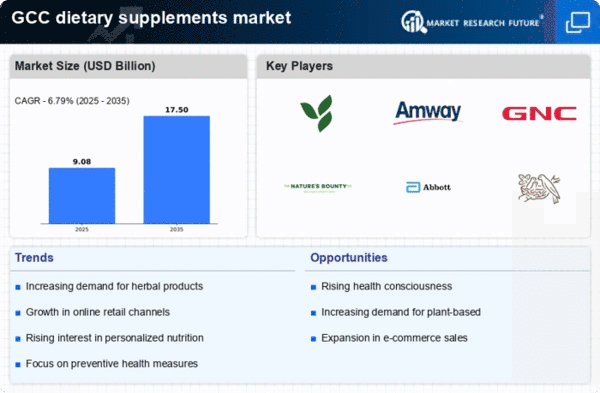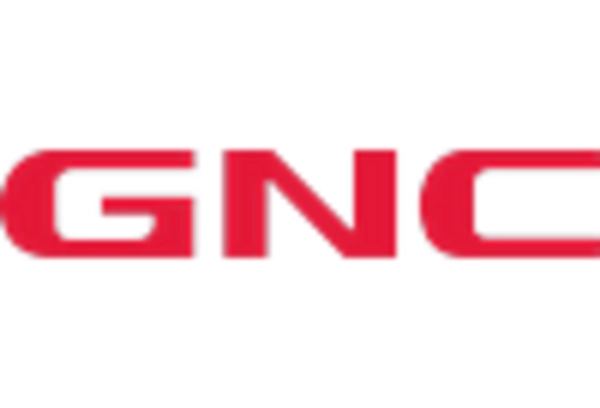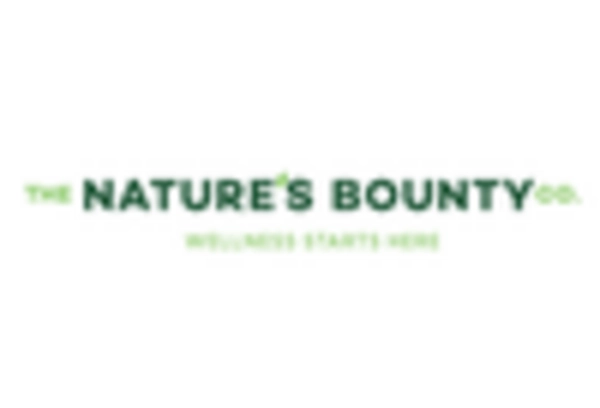Rising Disposable Incomes
In the GCC, rising disposable incomes are significantly impacting consumer spending patterns, particularly in the dietary supplements market. As individuals experience increased financial flexibility, they are more willing to invest in health-related products. This trend is particularly pronounced among the affluent segments of the population, who prioritize premium dietary supplements that promise enhanced health benefits. The dietary supplements market is projected to expand as consumers seek high-quality, innovative products that align with their health goals. This shift in spending behavior is expected to contribute to a compound annual growth rate (CAGR) of around 7% over the next five years, indicating a robust market trajectory fueled by increased purchasing power and health awareness.
Growing Health Consciousness
The dietary supplements market is experiencing a notable surge in demand, driven by an increasing awareness of health and wellness among consumers in the GCC. This trend is reflected in the rising number of individuals seeking preventive healthcare solutions, which has led to a projected growth rate of approximately 8% annually in the dietary supplements market. Consumers are increasingly prioritizing their health, leading to a shift towards products that support immunity, energy, and overall well-being. This heightened health consciousness is particularly evident among younger demographics, who are more inclined to incorporate dietary supplements into their daily routines. As a result, manufacturers are responding by innovating and diversifying their product offerings to cater to this evolving consumer preference, thereby further propelling the dietary supplements market in the region.
Regulatory Support and Standards
The dietary supplements market benefits from a robust regulatory framework in the GCC, which aims to ensure product safety and efficacy. Regulatory bodies are increasingly implementing stringent guidelines for the manufacturing and marketing of dietary supplements, fostering consumer trust and confidence. This regulatory support is crucial as it encourages companies to adhere to high-quality standards, which, in turn, enhances the overall credibility of the dietary supplements market. Furthermore, the establishment of clear labeling requirements and health claims has empowered consumers to make informed choices. As a result, the dietary supplements market is likely to witness sustained growth, with an anticipated increase in market value reaching approximately $1.5 billion by 2026, driven by both consumer demand and regulatory compliance.
Increased Demand for Natural Ingredients
There is a discernible shift towards natural and organic ingredients within the dietary supplements market, as consumers in the GCC become more discerning about product formulations. This trend is driven by a growing preference for clean-label products that are perceived as safer and healthier. As a result, manufacturers are increasingly sourcing high-quality natural ingredients to meet consumer expectations. The dietary supplements market is likely to benefit from this demand, with a projected increase in sales of products featuring herbal and plant-based components. This shift not only aligns with consumer preferences but also reflects a broader movement towards sustainability and environmental consciousness, which is expected to further enhance the market's growth prospects.
Influence of Social Media and Digital Marketing
The dietary supplements market is increasingly influenced by social media and digital marketing strategies, which play a pivotal role in shaping consumer perceptions and purchasing decisions. In the GCC, brands are leveraging platforms such as Instagram and Facebook to engage with health-conscious consumers, promoting their products through influencers and targeted advertising. This digital engagement not only raises awareness but also drives sales, as consumers are more likely to trust recommendations from social media personalities. The dietary supplements market is witnessing a transformation in marketing approaches, with an estimated 30% of sales attributed to online channels. This trend suggests that effective digital marketing strategies will be essential for companies aiming to capture a larger share of the growing market.
















